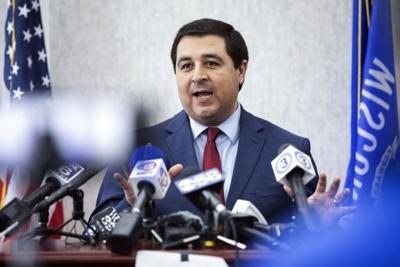MADISON — Elected officials reacted to the Wisconsin Supreme Court ruling Wednesday which struck down the state’s controversial 1849 abortion ban on a 4-3 split, with help from a liberal majority.
The ruling came after the 2022 U.S. Supreme Court decision overturned the landmark 1973 Roe v. Wade abortion ruling, leaving laws regulating abortions up to states, leading to confusion in healthcare field and the general populace regarding what is legal and what is not.
The Wisconsin Supreme Court ruled Wednesday that newer state laws regulating the procedure, including statutes that criminalize abortions only after a fetus can survive outside the womb, supersede the 1849 law.
The ban prohibited destroying “an unborn child.” It was interpreted as a near-total ban, making it a felony for anyone other than the mother or a doctor in a medical emergency to destroy an “unborn child.”
State Rep. Clinton Anderson, D-Beloit, said in a statement that striking down the 1849 law was a “step in the right direction” but “full reproductive freedom is not secured” until the Legislature codifies abortion statutorily and removes “medically unnecessary barriers to critical care.”
“Advocacy groups around the state have been working for reproductive freedom for years, and they can breathe a sigh of relief today. But we must do more and pass previously introduced legislation to clear these restrictions and guarantee a right to abortion to all Wisconsinites,” Anderson said.
State Sen. Mark Spreitzer, D-Beloit, in a statement referred to the 1849 as “archaic” and said it “put lives at risk.” He called the ruling a critical step forward.
“I have heard countless stories from physicians, nurses, and patients that illustrate how dangerous and cruel Wisconsin’s outdated law was — banning abortion even in cases of rape, incest, or serious medical complications. That ends today,” Spreitzer said. “Abortion is healthcare, and as your State Senator I will continue to do all that I can to protect the right to choose. Because of today’s decision, Wisconsin is a safer place. I applaud this decision by the Wisconsin Supreme Court.”
U.S. Sen. Tammy Baldwin, D-Wisconsin, said in a statement that the U.S. Supreme Court “stripped millions of Americans of their constitutional right to make their own health care decisions.”
“This archaic criminal abortion ban was passed before the Civil War, decades before women had the right to vote, and just a year after Wisconsin became a state,” Baldwin said. “Today’s ruling tells women across Wisconsin that we will not go back. Today’s ruling tells women that our government trusts you to make decisions about your own body and your future. Today’s ruling tells women in our state that they are not second-class citizens. But, this fight is not over.”
Wisconsin Attorney General Josh Kaul, a Democrat, filed a lawsuit the year of Roe v. Wade being overturned, citing a 1985 law essentially allowing abortions until viability. Some babies can survive with medical help after 21 weeks of gestation.
“This marks a major victory for reproductive freedom following the uncertainty and harm to women’s health that have resulted from the U.S. Supreme Court’s overturning of Roe v. Wade,” Kaul said. “At a time when rights are endangered, this ruling is a powerful reminder of the importance of advocating for our freedoms.”
Kaul said he has no plans to challenge the remaining restrictions, saying the Legislature should instead revise the abortion policy.
Justice Annette Ziegler called the ruling “a jaw-dropping exercises of judicial will” and said the liberal justices caved in to Democratic constituencies.
“Put bluntly, our court has no business usurping the role of the legislature, inventing legal theories on the fly in order to make four justices’ personal preference the law,” Ziegler said.
Responses from Sen. Ron Johnson and U.S. Rep. Bryan Steil were not immediately available at deadline.
Gov. Tony Evers said that he had been “fighting like hell” to ensure eveyone in Wisconsin has the freedom to consult family, faith and their doctors to make reproductive healthcare decisions.
“Today is a win for women and families, a win for healthcare professionals who want to provide medically accurate care to their patients, and a win for basic freedoms in Wisconsin, but our work is not over,” Evers said. “I will continue to fight any effort that takes away Wisconsinites’ reproductive freedom or makes reproductive healthcare, whether birth control, abortion, IVF, or fertility treatments, any less accessible in Wisconsin than it is today. That is a promise.”
In a statement, Michelle Velasquez, the chief strategy officer of Planned Parenthood of Wisconsin called the ruling an “important step forward” for access to abortion in the state.
“Since the overturning of Roe v. Wade, Planned Parenthood of Wisconsin has maintained that the 1849 law to ban abortion could not be enforced against abortion providers. This final ruling again confirms this,” Velazquez said. “We are grateful to Attorney General Kaul and Governor Evers for their leadership and efforts to protect reproductive freedom in Wisconsin.”
Responses from Sen. Ron Johnson and U.S. Rep. Bryan Steil were not immediately available at deadline.
The Associated Press contributed to this report.









